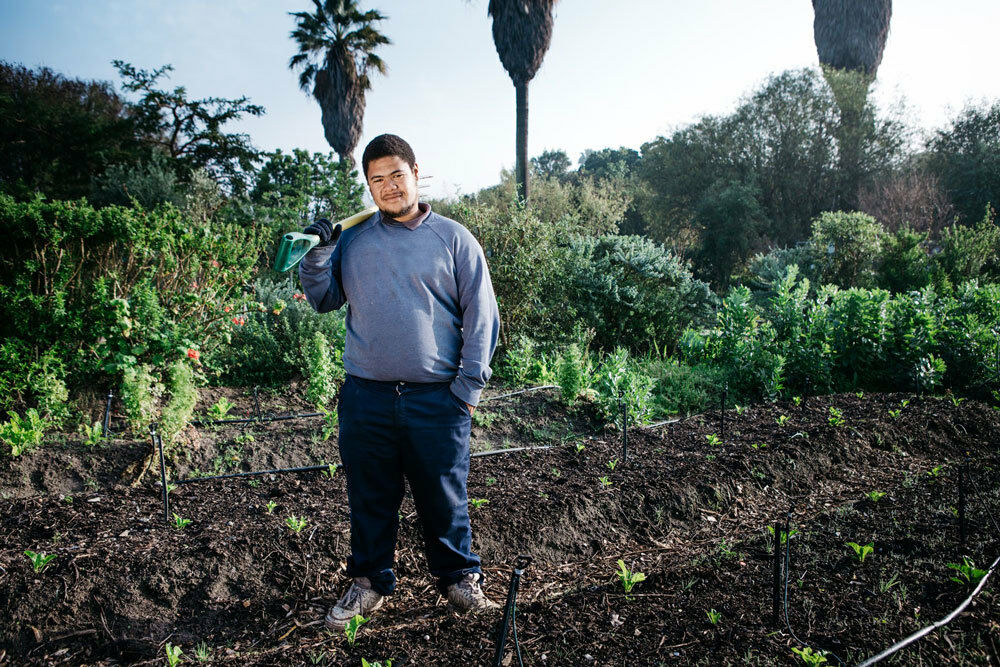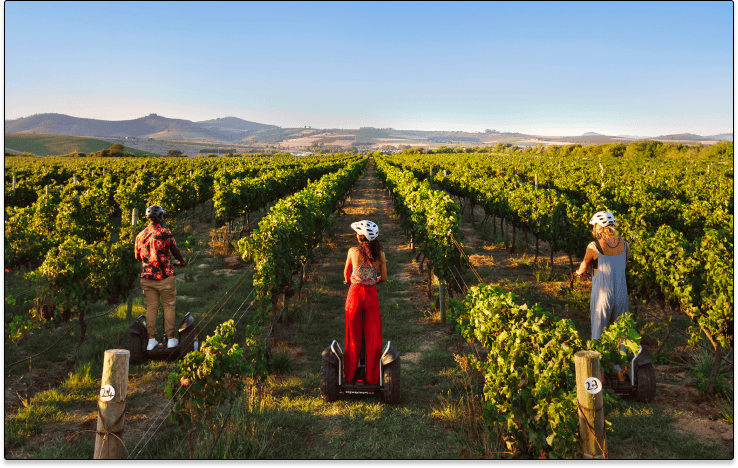Three years ago we celebrated the launch of the Living Soils Community Learning farm in partnership with the Sustainability Institute and Woolworths.
Above: Eldrick October during his internship with Living Soils. He is now the food garden manager at the Vlottenburg Primary School.
The Living Soils Learning Farm reflects a model for community-based food security using sustainable farming methods, training and developing young farmers in an effort to address local youth unemployment. A core purpose of the farm has been to experiment and explore how to build capacity and know-how through experiential learning for young and emerging farmers and youth in the Cape Winelands area.
From this vision, a Living Soils internship has emerged, providing the opportunity for practical skills development to grow food by receiving hands-on experience on the farm, coupled with the entrepreneurial and management skills required to run a farming enterprise, and personal development such as leadership, facilitation and communication.
Rirhandzu Marivate, project manager of the Living Soils Community Learning Farm, and her team discovered that it was easy for people to learn how to grow food but making a business out of it was the real challenge. Therefore, entrepreneurial skills are an important aspect of the internship, incorporating both personal and business financial management, as well as agronomy, farm management and their associated planning process. It was evident to the Living Soils team that the internship would need to support holistic development by not only providing hard and practical skills, but the soft ones necessary for mental and emotional wellbeing too. In this way, when leaving the internship, individuals are not only capacitated but empowered to carry themselves with confidence and determination.
The Living Soils Community Learning Farm currently offers opportunities for young farmers and the local youth. The first young farmers that entered the internship programme were students of the Sustainability Institute’s Agroecology Academy, where they underwent a rigorous four-year training course with their practical learning taking place on the farm as interns. The first four women to complete the internship programme, Sindiswa, Thandi, Vuyo and Phuthuma, are now junior farm managers at Living Soils, with seven more students completing the programme in 2020. The young farmers joining Living Soils know how to farm sustainably, but in the internship, they learn the context for why this is important through an introduction to food systems. Living Soil’s Permaculturalist Yoliswa Mahobe guides the interns to a new understanding of the interconnection between nature and growing food, putting ‘heart’ back into sustainable food farming. Not everyone wants to be a farmer however, so a part of the internship is also to identify other areas for individuals to become change agents, enabling them to work within the food system in more than one way.
Youth from Lynedoch and surrounds, two of which coming through the SI’s youth programme, experienced a slightly different internship. The purpose of the youth internship is to transform their relationship with agriculture; many come from farmworker communities and have a negative association with agriculture after generations of their families having worked on farms. The internship aspires to establish a love for farming and with it long-term food security in the youth’s communities. Their introduction to food systems speaks to culture, heritage and history with indigenous food activist Zayaan Kahn and deep ecologist Shaun Dunn facilitating a reconnection to and reclamation of food systems; viewing the food system through the lens of culture and heritage relates a sense of ownership, empowerment and pride. Two of the recently graduated youth interns are already working on gardening projects, and another is a community facilitator and change agent presently managing a primary school food garden in a neighbouring area. For 2022, Living Soils hopes to take on two groups for five months, with a formal interview process, as “you have to show up for yourself in order for us to show up for you,” Rirhandzu explains.
Living Soils sets the foundations of what the internships need to cover, but each programme is specifically created for the present group using a design thinking process. This way, the internship never looks the same and caters to curiosities, needs and gaps that the farmers and youth identify themselves. The programme is then structured based on what is generally important to the unique group. Co-creating the process cultivates a sense of ownership and shared responsibility between the facilitators and interns.
The youth unemployment rate in South Africa is currently at 64%; in this context, Living Soils finds it essential to offer an above-minimum-wage stipend for all internships. Like unemployment, food insecurity is persistent and widespread in South Africa where malnutrition, from stunting to obesity co-exist with major impacts on health and wellbeing. The Living Soils youth internship is hoping to address this in the wider Lynedoch community by reconnecting its members to their food system, and empowering them to become change agents for food security, livelihood and a relationship with nature, heritage and self. The aim of Living Soils in offering internships is to respond to youth unemployment and the need for skills development in the country while making meaningful change in the lives of their interns and their communities. It is fairly new and acknowledged that there is a lot of learning and reflection that needs to be done in order to continue to improve and ensure that what is offered is valuable. Living Soils is looking to partner with other training institutions and bring in more facilitators from the SI to contribute to the programme.
Learn more about Living Soils and keep up to date with its news.









